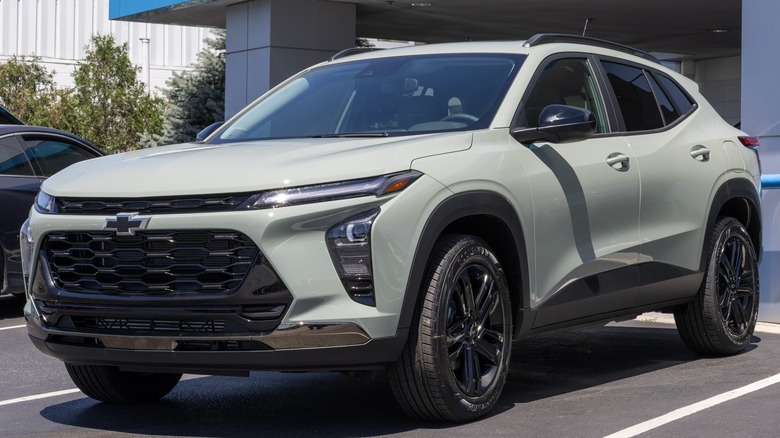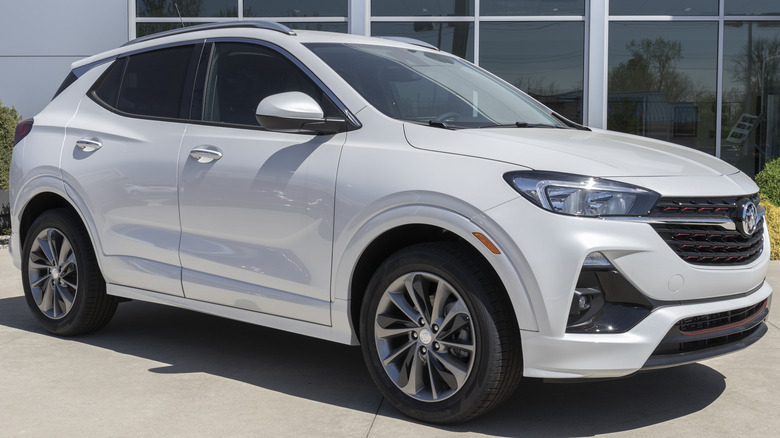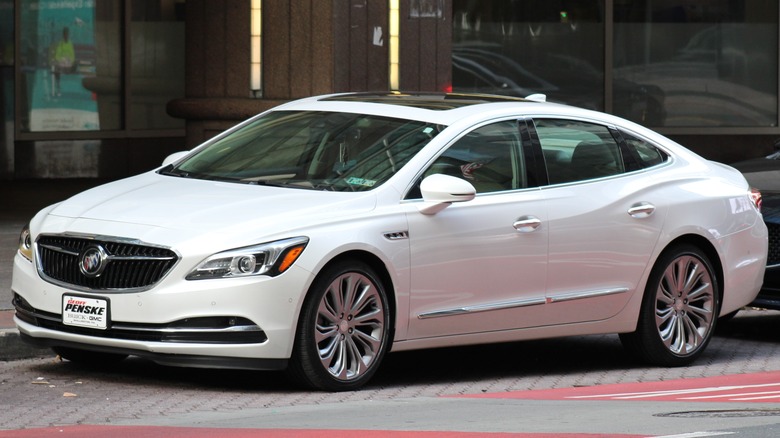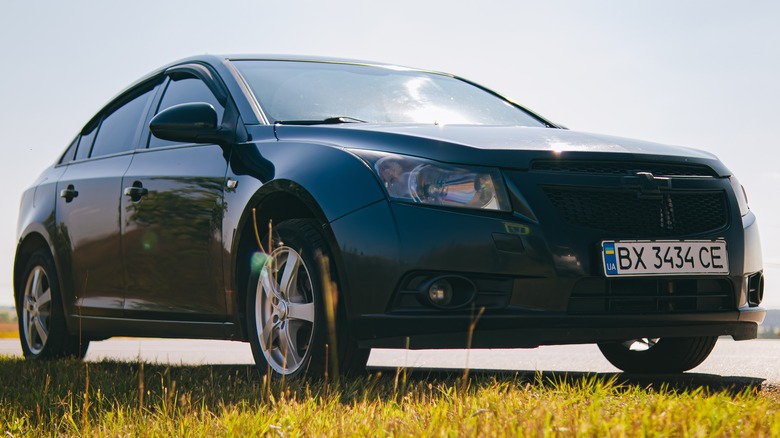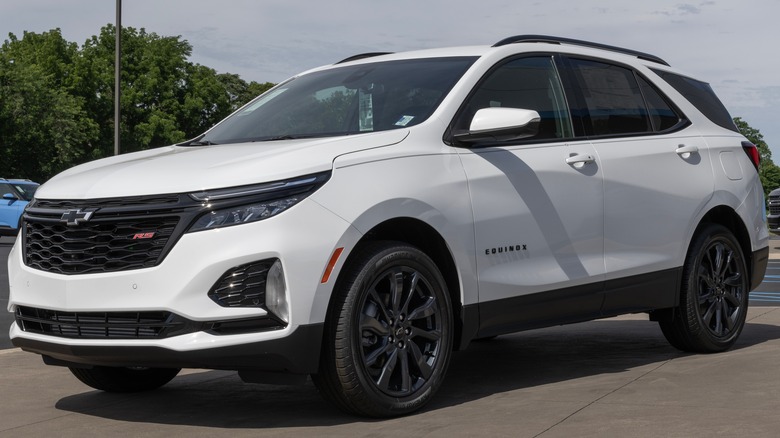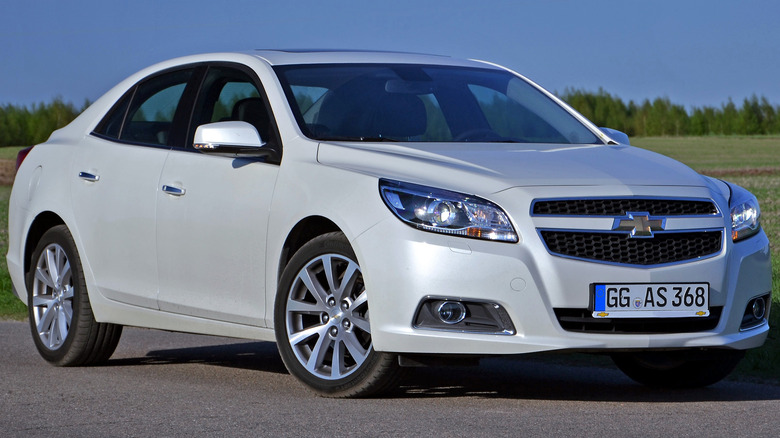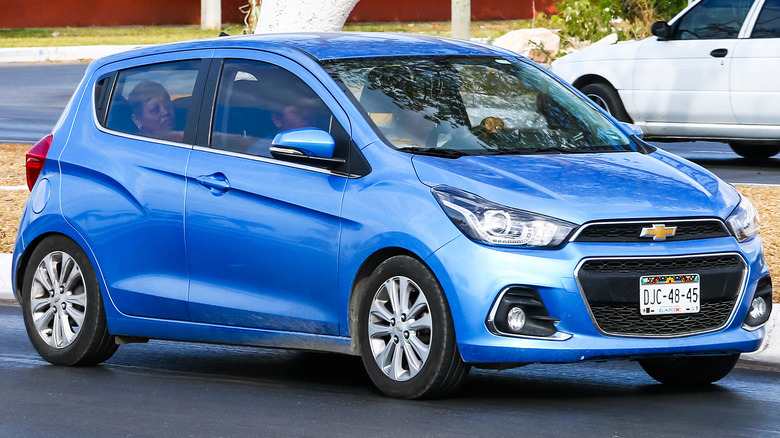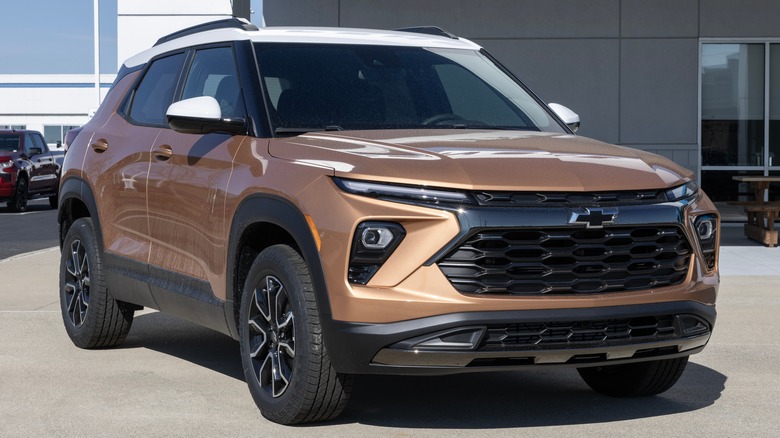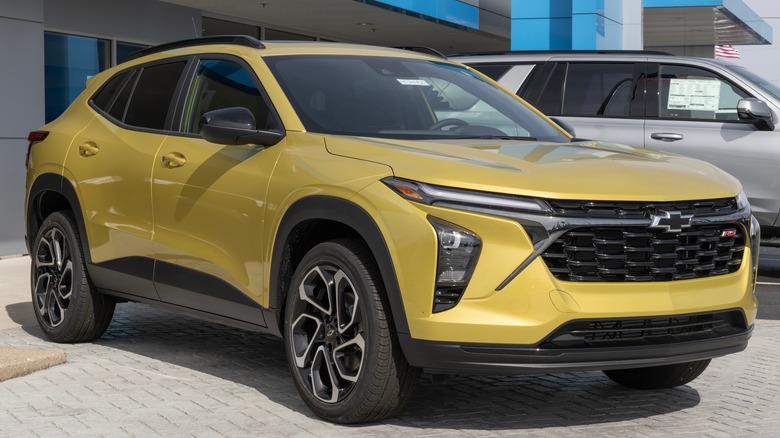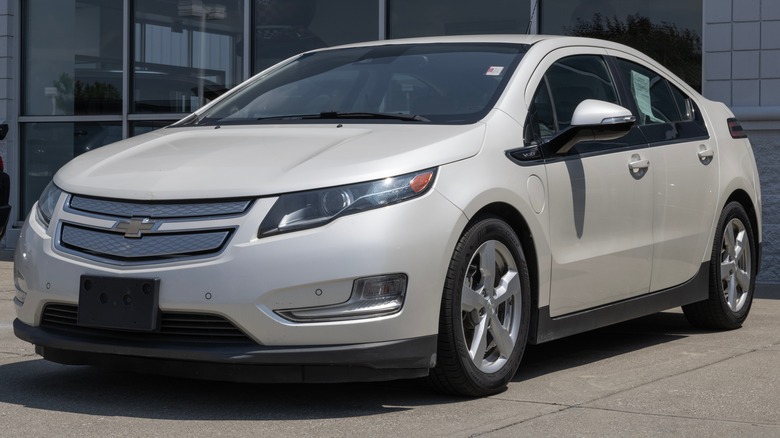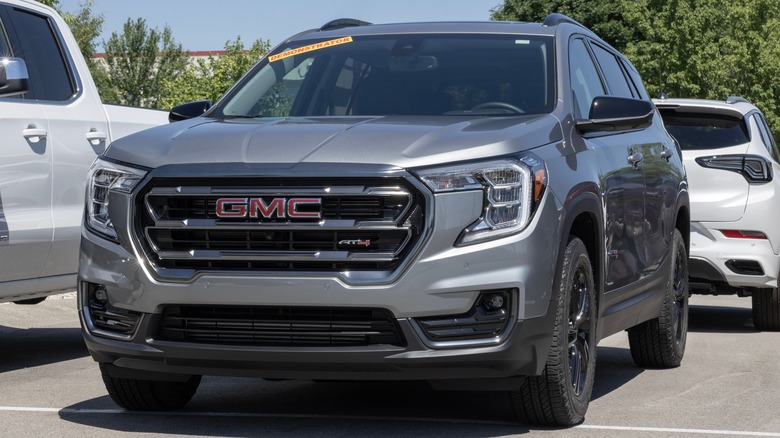10 Of The Most Reliable Cars Powered By The GM EcoTec Engine
General Motors' Ecotec engine has been a familiar name under the hoods of various Chevrolet, Buick, and GMC vehicles for over two decades. This versatile lineup caters to fuel-conscious drivers, offering a range of small displacement engines (1.0 to 2.5 liters). Not to be confused with the larger, truck-based EcoTec3 engines, these smaller versions prioritize efficiency without sacrificing performance in cars and compact SUVs.
Beyond impressive gas mileage, Ecotec engines are synonymous with smooth operation. Direct injection technology and a clever mounting system for the fuel rail minimize noise and vibration, ensuring a quieter driving experience. Available in naturally aspirated and turbocharged flavors, these engines offer choices for drivers seeking either strong fuel economy or a boost in overall performance.
Below, we delve deeper into the most reliable cars powered by the Ecotec engine lineup. These vehicles are known for their low annual repair costs (which we pull from RepairPal) and consistently high ratings (over 80/100) on J.D. Power's quality and reliability scale. We also pull used vehicle prices from Kelley Blue Book.
Buick Encore
Introduced in 2013, the Buick Encore carved a niche as the brand's go-to subcompact SUV. It had qualities like a front-sloping design, small size, and quiet, smooth driving experience. Buick built it on the Gamma II platform, which it shared with the Chevrolet Trax and European Opel Mokka. However, unlike these two, its production ended in 2022, replaced by the slightly larger and more luxurious Encore GX.
Initially, the Encore shared GM's 1.4-liter turbocharged Ecotec four-cylinder engine with the Chevrolet Sonic and Cruze. While the model was peppy in the smaller cars, its 138 horsepower and 148 pound-feet of torque struggled with the Encore's 3,190-pound curb weight. This was a point where rivals like the BMW X1 and Volkswagen Tiguan offered more exciting performance. However, the Ecotec engine did offer a trade-off: fuel economy. The Encore achieved a respectable 28 miles per gallon (mpg) combined rating in its base configuration. Buick addressed the power issue in 2016, offering an optional 153-horsepower, 1.4-liter Ecotec turbo-four.
While production of the Encore may have ended in 2022, these models remain budget-friendly options. Prices range from $4,521 for a 2013 model to $16,520 for a 2022, per Kelley Blue Book. Beyond affordability, the Encore boasts impressive J.D. Power quality and reliability ratings, reaching as high as 90/100. Newer models, with fewer reported problems and recalls, contribute to the Encore's low annual repair cost average of $466, per RepairPal. Safety is another strong point, with some model years earning National Highway Traffic Safety Administration (NHTSA) five-star and Insurance Institute for Highway Safety (IIHS) Top Safety Pick ratings.
Buick LaCrosse
Unveiled in 2005, the LaCrosse was a premium sedan, succeeding the Buick's Century and Regal models. This all-new option boasted a contemporary interior and refined powertrains, aimed to solidify the brand's return to the luxury market. Initially available with V6 engines, the LaCrosse soon embraced economy by introducing a gasoline-electric hybrid powertrain in 2012. It paired a 2.4-liter Ecotec four-cylinder with an electric motor, producing 182 horsepower and an impressive fuel economy rating of 28 mpg combined.
Beyond this powertrain, the LaCrosse's cabin impressed with upscale materials and elegant curves. Standard features included automatic air conditioning, a power-adjustable driver's seat, leather seating, and a premium Harman/Kardon audio system. Buick also prioritized safety, equipping the LaCrosse with a healthy list of standard safety features, including a blind spot alert system, OnStar telematics system, and comprehensive airbags. These features translated into top safety ratings, with NHTSA awarding it a five-star overall safety rating for most model years. IIHS also bestowed multiple LaCrosse models with the Top Safety Pick rating.
Customer feedback consistently praised the LaCrosse's smooth ride, energetic performance, and comprehensive safety features. This translated to a satisfying ownership experience, with J.D. Power awarding some LaCrosse model years exceptional quality and reliability ratings of up to 90/100. Furthermore, the brand's reputation was bolstered by its low average annual repair costs of $569, per RepairPal.
Chevrolet Cruze
The Cruze was Chevy's small sedan, introduced in 2011 as a successor to the Cobalt. Released during a challenging time for GM, the Cruze stood out with its efficient powertrains. It ditched the tradition of larger-than-average engines in small cars for a pair of peppy fuel-efficient designs: a 1.8-liter naturally-aspirated four-cylinder and a 1.4-liter turbocharged Ecotec four-cylinder. These delivered class-competitive performance, impressive fuel economy, and lower weight compared to their predecessors, which helped make the Cruze's handling sharper than the Cobalt.
In 2016, a redesigned Cruze arrived, sporting a fresh look to rival established players like the Toyota Corolla and Honda Civic. Chevy simplified the powertrain lineup to a single, more potent 1.4-liter Ecotec turbo-four with 153 horsepower. This newer engine achieved an impressive fuel economy rating of 34 mpg combined.
Although Chevy did away with the Cruze in 2019, it garnered a reputation for safety and reliability, consistently earning NHTSA's five-star safety ratings and Top Safety Pick ratings from IIHS. J.D. Power also lauded its quality and reliability, awarding some model years an impressive score of up to 88/100. Today, the Chevrolet Cruze still remains an affordable proposition in the used market. Kelley Blue Book says early models fetch as low as $4,327, while newer ones reach up to $15,618. This reflects the Cruze's reputation for a positive ownership experience, with average annual repair costs hovering around $545, per RepairPal.
Chevrolet Equinox
Introduced in 2005, the Equinox was Chevy's versatile and spacious compact SUV for suburban dwellers. Initially sharing a platform with the Saturn Vue, the Equinox offered only V6 muscle. However, in 2010, Chevrolet made a fuel-efficient shift, introducing a 2.4-liter Ecotec four-cylinder engine. This change not only improved gas mileage (26 mpg combined versus 20 mpg combined for the V6), but also laid groundwork for the Ecotec's dominance under the Equinox's hood.
Not one to rest on its laurels, Chevrolet revamped the powertrain again in 2018. This iteration saw the introduction of an even more compact and efficient Ecotec engine: a 1.5-liter turbo-four with 170 horsepower. While not the strongest option, this engine, coupled with the 400-pound weight reduction and 5-inch size decrease, proved surprisingly adept at navigating city streets and highways. Today's Equinox exclusively relies on the Ecotec engine, with the 2021 model year solidifying this shift. Interestingly, the 2024 version boasts 5 additional ponies for a touch more pep.
The Chevrolet Equinox has constantly impressed with its safety ratings. Over the years, it has garnered numerous NHTSA five-star overall safety ratings and IIHS Top Safety Pick designations. Reliability sores haven't lagged behind either, with most models receiving high quality and reliability scores from J.D. Power (over 80/100, with some reaching 90/100). This commitment to quality is reflected in the Equinox's ownership experience, with an average annual repair cost of $537, per RepairPal.
Chevrolet Malibu
The Malibu is a cornerstone of the Chevrolet lineup, having sold over 10 million vehicles in its six-decade history. In 2016, the company completely redesigned the car, giving it a stylish exterior, a modern interior, and a performance boost under the hood. Gone was the naturally aspirated 2.5-liter engine, replaced by a pair of turbocharged Ecotec four-cylinders: a 1.5-liter offering 160 horsepower and a 2.0-liter with 250 horsepower.
The base engine gave up 36 horsepower compared to its predecessor, but with improved economy at 30 mpg combined. The turbocharger also helped deliver satisfying low-end torque, making the Malibu more energetic. While these Ecotec engines offered respectable fuel economy, none could compete with the hybrid Malibu's impressive 46 mpg combined. Today, the car soldiers on with the sole 1.5-liter option, which may explain its discontinuation as competitors like the Toyota Camry, Honda Accord, and Hyundai Sonata boast stronger base engines. This move likely paves the way for Chevrolet's future electric vehicles.
Despite its recent farewell, the Malibu leaves behind a legacy of reliability. It consistently earned high marks from J.D. Power, with some model years achieving an outstanding 92/100 quality and reliability score. While recalls have occurred over the years, they were addressed at dealerships at no cost to the owner. This helped contribute to the Malibu's low average annual repair cost of $532, per RepairPal. Safety also remained a priority, as evidenced by the Malibu's five-star NHTSA overall rating and IIHS Top Safety Pick+ score.
Chevrolet Spark
The Chevrolet Spark, a subcompact hatchback with a global presence, arrived in the U.S. in 2012 for the 2013 model year. It quickly became a sales leader for Chevrolet, outperforming rivals like the Scion iQ and Fiat 500 thanks to its budget-friendly starting price. Powering this success was a fuel-sipping 84 horsepower, 1.2-liter Ecotec four-cylinder, which boasted an impressive 34 mpg combined fuel economy rating. In 2016, the Spark received a major overhaul, introducing more power, a new chassis, and more standard safety features. The Ecotec engine baton passed to a 98 horsepower, 1.4-liter four-pot, offering enhanced drivability around town without sacrificing fuel economy.
While not immune to recalls, the Spark's issues typically didn't impact core components like the engine and transmission. This contributed to its reputation for reliability, with an average annual repair cost of $434, per RepairPal. It also helped increase its overall quality and reliability ratings, with the 2017 model earning a J.D. Power score of 86/100. Safety wasn't compromised in this pint-sized package, either. The Spark offered a long list of standard safety features, including Chevrolet's OnStar service, hill hold assist, four-wheel antilock brakes, and front, side, and rear airbags.
Despite its impressive offerings, the Spark fell short of Chevrolet's sales expectations, eventually exiting the brand's lineup in 2022. This wasn't an isolated event — the vehicle joined the company's other models like the Cruze and Sonic. Fortunately, the Spark continues to be a compelling option in the used market. According to Kelley Blue Book, earlier models start at an affordable $4,069, while the newer designs fetch a higher price of $11,827.
Chevrolet Trailblazer
Chevrolet resurrected the Trailblazer in 2021, transforming it into a subcompact SUV nestled between the Trax and Equinox. It filled the void left by the original model's 2009 departure, mirroring the successful comeback of the 2020 Blazer SUV. Under the hood, the Trailblazer boasted two energetic Ecotec turbo engines — a 1.2-liter and a 1.3-liter, both with three cylinders. While the base 1.2-liter provided a balance of affordability and decent fuel economy (29 mpg combined), the 1.3-liter offered a livelier driving experience and slightly better mileage (31 mpg combined).
Today, the Trailblazer delivers a compelling value proposition. Chevrolet says it starts at a competitive $23,100, and it comes loaded with tech-forward features like an 11-inch infotainment touchscreen, wireless smartphone connectivity, and a comprehensive suite of safety features. The latter includes lane departure warning, blind spot monitoring, automatic emergency braking, and rear cross-traffic alert.
These features, coupled with its solid build quality, have earned the Trailblazer a five-star NHTSA overall safety rating and the prestigious IIHS Top Safety Pick+ designation. Furthermore, J.D. Power has consistently awarded the car high marks for quality and reliability, with the 2022 model achieving an impressive 86/100 score. Further solidifying its dependability, the Trailblazer boasts minimal recalls, with none impacting critical components like the engine or transmission. This translates to a budget-friendly average annual repair cost of $524, per RepairPal.
Chevrolet Trax
Chevrolet launched the Trax globally in 2013, bringing this affordable subcompact SUV to the U.S. two years later. This chunky-styled offering competed with the Nissan Juke, promising up-to-date tech for city drivers. Sharing its GM's Gamma II platform with the Buick Encore, the Trax thrived in urban environments.
Powering the early Trax was a 1.4-liter Ecotec turbo-four with 138 ponies. While it offered sufficient pep for urban adventures, it lacked muscle for highway sprints. Addressing this, Chevrolet introduced a livelier 155 horsepower Ecotec turbo-four in 2022, which only lasted a year. The all-new 2024 Chevrolet Trax brings a smaller, 1.2-liter turbocharged Ecotec three-pot engine. While less powerful than its predecessors, it achieves the best-in-line fuel economy of 30 mpg combined.
In addition, reliability has been a hallmark of the Trax, with J.D. Power quality and reliability ratings peaking at 85/100 for the 2015 and 2021 models. Reassuringly, the Trax has had a history of few recalls, further contributing to its low average annual repair cost of $488, per RepairPal. Moreover, safety is another strong point, with NHTSA consistently granting it the coveted five-star rating.
The 2024 Chevrolet Trax maintains a budget-friendly starting price of $20,400. However, older models offer even greater affordability, with 2015 models starting at $5,127, according to Kelley Blue Book. While the older Trax has 1 hp more than the newer model, it lacks the 2024's technological advancements, like the larger 11.0-inch infotainment touchscreen, wireless smartphone compatibility, and Chevy's safety assist suite.
Chevrolet Volt
Introduced in 2011, the Chevrolet Volt was the world's first plug-in hybrid. This competent small car broke ground by seamlessly combining two power sources: an internal combustion engine and a 149-horsepower electric motor. The 1.4-liter Ecotec four-cylinder acted as a generator for GM's extended-range electric vehicles, allowing the Volt to travel a remarkable 380 miles on a single tank and 35 miles purely on electric power. Though the initial price tag hovered around $40,000, the Volt was lauded for its economical short excursions and instant burst of electric power.
The first generation remained largely unchanged, offering gradual price reductions. However, a complete overhaul arrived in 2016 with the second-generation Volt. This iteration brought significant upgrades, most notably in range — 420 miles on gasoline and 53 on electric power. This revised powertrain featured two electric motors and a 1.5-liter L3A Ecotec engine.
Beyond its impressive efficiency, the Volt also prioritized safety. It achieved an NHTSA five-star overall safety rating and earned the Top Safety Pick+ IIHS rating. Reliability proved another strong suit, with J.D. Power awarding the Volt quality and reliability scores as high as 89/100. While there were a few recalls over its time, its lower frequency of repairs contributed to its annual repair costs of around $550, per RepairPal. Unfortunately, Chevrolet discontinued the Volt in 2019. However, with the growing focus on fuel-efficient and eco-friendly vehicles, the Volt's return to the market could offer a compelling alternative to established contenders like the Toyota Prius Prime.
GMC Terrain
GMC launched the Terrain in 2010, vying for a slice of the compact SUV market dominated by the Ford Escape, Toyota RAV4, and Honda CR-V. Initially, GMC equipped the Terrain with a 2.4-liter Ecotec four-cylinder engine, creating more power with less fuel. While not part of the smaller Ecotec family, it helped give the Terrain a superior fuel economy rating of 26 mpg combined.
The arrival of the second-generation Terrain in 2018 mirrored the revised Chevrolet Equinox, adopting a downsized philosophy. This new Terrain embraced the smaller 1.5-liter Ecotec turbo-four with 170 horsepower — a 12-horsepower dip from its predecessor. Despite the decrease, the ambitious vehicle proved sufficient for daily driver duties, as long as heavy cargo or passengers weren't a frequent occurrence. The Ecotec also boasted a better fuel economy rating of 28 mpg combined. As of 2024, its latest iteration bumps horsepower to 175, keeping the small engine family relevant.
The Terrain has consistently had great J.D. Power quality and reliability ratings, with the 2024 model achieving a stellar 88/100 score. This translates to lower ownership and repair costs, averaging a reasonable $558 annually according to RepairPal. While GMC says the 2024 model starts at $28,700, earlier designs offer significant savings on the used market, starting as low as $4,821, per Kelley Blue Book. Understandably, they lack the modern features of their successors. However, they hold a safety advantage, with some receiving the coveted IIHS Top Safety Pick+ rating. The Terrain maintains a solid safety record regardless of generation, consistently earning a five-star NHTSA rating.
